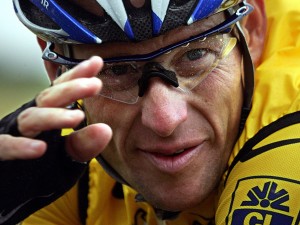Armstrong loses Olympic medal ahead of Oprah airing
LOS ANGELES—Lance Armstrong was stripped of his 2000 Olympic bronze medal hours before the airing Thursday of his eagerly-awaited tell-all interview with US talkshow queen Oprah Winfrey.
Fans and critics of the disgraced cycling icon were waiting to hear the breadth of his doping admission and the depth of his contrition, as another honor was stripped from his sullied list of achievements.
The shamed US rider’s first interview since he was stripped last year of his record seven Tour de France titles was recorded in Austin, Texas, on Monday and is due to be aired in two segments on Thursday and Friday night.
In it, talkshow host Winfrey, known for her empathetic celebrity interviews, said the 41-year-old admitted taking illegal substances and provided answers “that all people around the world have been waiting to hear.”
But, as speculation swirled about whether he had implicated others — notably members of the sport’s world governing body, amid allegations of complicity and cover-up — he was stripped of his 2000 Olympic bronze medal.
The International Olympic Committee said they had asked Armstrong to return the time-trial medal after a three-week time-limit elapsed for him to appeal against the sanctions imposed by the International Cycling Union (ICU).
Abraham Olano of Spain, who was fourth, may be set to inherit the bronze in a race won by Armstrong’s ex-US Post Service team-mate Viasheslav Ekimov and which saw Jan Ullrich of Germany take silver.
Ekimov is now general manager of the Katusha cycling team that were dropped from the elite ProTeam list for this season because of their ambivalent stance on doping. Ullrich eventually served a two-year ban for doping.
Armstrong’s admission, after years of aggressive denials, is an astonishing reversal and has stunned the sport as much as the devastating report last August that lifted the lid on his activities and saw him banned for life.
“No one could have imagined only a few weeks ago that Lance Armstrong would make his confession publicly, that he would confess in public to having been doped,” Tour de France director Christian Prudhomme told reporters in Paris.
“It’s obviously something very important but I can’t say more than that, I don’t know more than you. I don’t know what he’ll say. For us, Lance Armstrong is already in the past.”
Just as word of Armstrong’s admission leaked on Monday, snippets of information have trickled out on the eve of the telecast.
The New York Times reported that Armstrong “teared up and cried” during the interview, which Winfrey has characterized as “intense”, although the newspaper’s source did not say what caused Armstrong to lose his composure.
The New York Daily News cited an anonymous source as saying Armstrong “does not seem sorry” about his choice to use banned drugs, while the Washington Post said Armstrong challenges the USADA’s portrayal of him as vindictive.
Winfrey said that she felt Armstrong was “thoughtful” and “serious” in his approach but added she would leave it up to viewers to judge whether he was remorseful.
“I would rather people make their own decisions about whether he was contrite or not,” she told CBS television on Tuesday.
Armstrong’s confession is likely to give fresh ammunition to critics of the embattled UCI, amid lingering questions about how doping by Armstrong and in the peloton went undetected for so long.
The UCI, under fire for refusing an amnesty for doped riders, has refrained from any self-criticism in response to the scandal, while its creation of an independent commission to look at its role has been branded weak.
The stakes are also high for Armstrong, who was dropped by high-profile sponsors and stepped down from the cancer support charity that he founded in the wake of the revelations.
Some have seen the belated confession as an attempt to restore his tarnished image and faith in the integrity of professional cycling after its doping-scarred past.
But he also opens himself up to potential litigation and the possible loss of millions of dollars or even criminal charges by admitting that he lied about taking performance-enhancing drugs.
